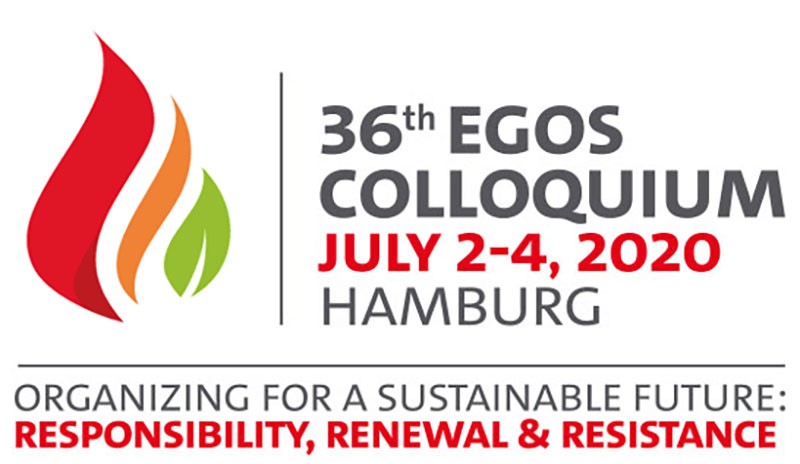Sub-theme 19: Collective Action in Crisis?
Call for Papers
Responding to the theme of the 2020 EGOS Colloquium “on the role, contribution, and stress factors of, and for, organizations,
as well as the different ways of organizing in order to promote an agenda towards a sustainable future”, this sub-theme addresses
an important aspect of this question: how collective action is accomplished during situations of crises. The problem of the
organization and governance of collective action surfaces, as particularly apparent in crisis situations, such as in war zones
or the management of large-scale humanitarian emergencies. Such contexts often evade clear-cut classification and present
challenges in terms of polycentric governance, distributed decision-making and collective sensemaking for the actors involved.
The instability of these settings and the pressing need for collaboration amongst actors that do not necessarily share a common
history, tradition or identity make the organization and governance of collective action particularly challenging.
This sub-theme wants to investigate how collective action across a network of diverse actors is accomplished in such situations
of crisis. The focal question is: how can a collective of actors organize their capacity to act and make decisions in situations
of crisis? The sub-theme will explore collective action as form of collaboration and coordination beyond the well-worn modes
of the state, market and hierarchy. With the concept of collective action we zoom in on how heterogeneous networks of actors
that transcend organizational and institutional boundaries address crisis situations. Key questions include how the collective
develops a sense of purpose and identity, a shared strategic direction, and sustains coherence in action. We seek to explore
the institutional, organizational and strategic forces that enable and/or constrain effective collective action and its governance.
With crisis we delimit the empirical setting that we are interested in. We are inspired by the original meaning
of the Greek word ‘crisis’ – which derives from krínein – meaning to decide and to incise: the crisis is the moment
of decision, a radical interruption of temporality resulting in a loss of orientation that forces a decision which divides
the flow of events into a before and after. In this sense, crisis situations are not only low-probability, high-impact events
such as disasters, fires, or earthquakes; with the focus on crisis as decision-making under extreme contingency, we also include
empirical contexts addressing organizing under high uncertainty, in extreme contexts, or grand challenges.
Possible questions we want to pursue include:
Management practices: what are the routines, practices, technologies, plans, etc. through which crisis situation are managed?
Decision-making: How does decision-making within a network of actors sustain collective action during situations of crisis?
Polycentricity: How is coordination made possible under conditions of polycentric governance?
Sensemaking: How do interfaces and technologies harness cognition distributed across networks?
Performance: How is performance across the network evaluated, given that different actors might have different evaluative practices and principles?
Power: How are conflicts (between actors, etc.) resolved? What are consequences (intended and unintended) of collective action?
We welcome theoretical and empirical papers.
Indicative references
- Boin, A., & Lodge, M. (2016): “Designing resilient institutions for transboundary crisis management: A time for public administration.” Public Administration, 94 (2), 289–298.
- Danner-Schröder, A., & Geiger, D. (2016): Unravelling the motor of patterning work. Toward an understanding of the microlevel dynamics of enacting standard and flexible patterns.” Organization Science, 27 (3), 633–658.
- Ferraro, F., Etzion, D., & Gehman, J. (2015): “Tackling Grand Challenges Pragmatically: Robust Action Revisited.” Organization Studies, 36 (3), 363–390.
- Gigerenzer, G., & Gaissmaier, W. (2011): “Heuristic decision-making.” Annual Review of Psychology, 62 (1), 451–482.
- Hällgren, M., Rouleau, L., & de Rond, M. (2018): “A matter of life or death: How extreme context research matters for management and organization studies.” Academy of Management Annals, 12 (1), 111–153.
- Hirschman, A.O. (1971): Bias for Hope. Essays on Development and Latin America. New Haven: Yale University Press.
- Kendra, J., & Wachtendorf, T. (2006): “The waterborne evacuation of lower Manhattan on September 11: A case of distributed sensemaking.” Preliminary paper #355, University of Delaware, Disaster Research Center; http://udspace.udel.edu/bitstream/handle/19716/3194/Preliminary%20Paper%20%23355.pdf?sequence=1&isAllowed=y
- Kornberger, M., Leixnering, S., & Meyer, R.E. (2019): “The Logic of Tact: How Decisions Happen in Situations of Crisis.” Organization Studies, 40 (2), 239–266.
- Mair, J., Wolf, M., & Seelos, C. (2016): “Scaffolding: A Process of Transforming Patterns of Inequality in Small-scale Societies.” Academy of Management Journal, 59 (6), 2021–2044.
- Ostrom, E. (1990): Governing the Commons. The Evolution of Institutions for Collective Action. Cambridge, UK: Cambridge University Press.
- Weick, K.E. (1993): “The Collapse of Sensemaking in Organizations: The Mann Gulch Disaster.” Administrative Science Quarterly, 38 (4), 628–652.
- Westley, F., McGowan, K., Antadze, N., Blacklock, J., & Tjornbo, O. (2016): “How game changers catalyzed, disrupted, and incentivized social innovation. Three historical cases of nature conservation, assimilation, and women’s rights.” Ecology and Society, 21 (4), 13.
- Wolbers, J., Boersma, K., & Groenewegen, P. (2018): Introducing a Fragmentation Perspective on Coordination in Crisis Management.” Organization Studies, 39 (11), 1521–1546.
- Vaughan, D. (1996): The Challenger Launch Decision. Chicago: The University of Chicago Press.


